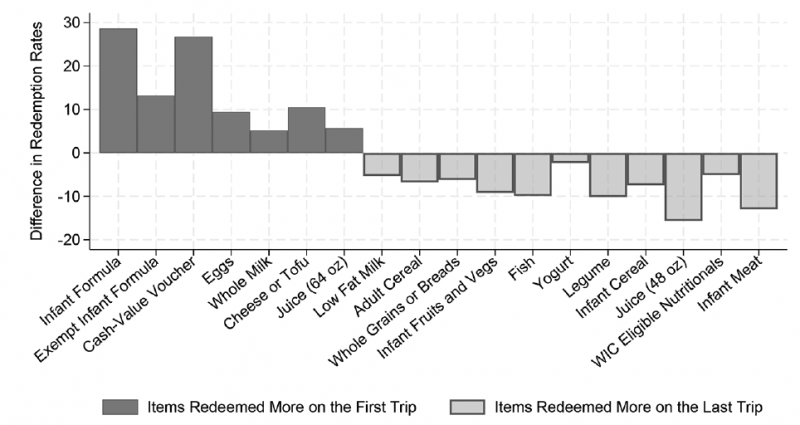In a recent study done by UC Davis professors Marianne Bitler and Seojung Oh as well as University of Utah professors Jason Cook and Paige Rowberry, evidence was found of a new form of benefit redemption cycle in Women, Infants, and Children (WIC), different from that seen with Food Stamps.
Key Facts
- WIC provides access to healthful foods to low-income, nutritionally at-risk pregnant, postpartum, and breastfeeding women, infants, and children under five years old.
- Administrative burden likely contributes to cyclicality in WIC redemptions; this cyclicality may mean inconsistent use among recipients.
- Reducing administrative burden in WIC may enable recipients to redeem benefits more consistently.
They found that WIC redemptions peaked at both the beginning and the end of the month. Redemptions overall were 4 percentage points higher on the first of the month relative to the middle of the month (see Figure 1). Beginning-of-the-month excess redemptions were concentrated among more fully redeemed items such as infant formula, while end-of-the-month excess redemptions were concentrated among less fully redeemed items such as infant meats. Many WIC beneficiaries went at least one month without redeeming anything. This cyclicality and inconsistency were likely due in part to administrative burden, which policymakers should seek to reduce.

Reducing administrative burden may enable expanded WIC redemptions
The authors found that WIC recipients did not redeem benefits smoothly within the benefit month. Instead, they redeemed some food items more at the beginning of the month and others more at the end. This evidence is inconsistent with the permanent income hypothesis, which presumes that the timing of anticipated income should not affect spending as long as households can smooth consumption across periods. The finding that a substantial share of recipients had monthlong gaps in their redemption patterns suggests that administrative burdens may be preventing consistent use.
To ease the strain placed by this cyclicality on disadvantaged families, policymakers could seek to minimize administrative burden that may prevent WIC recipients from redeeming their benefits consistently.
Read the full story here.
Media Resources
Media contact:
- Karen Nikos-Rose, Office of Strategic Communications: kmnikos@ucdavis.edu
